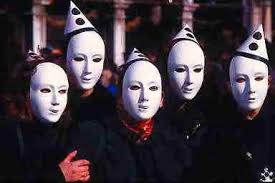MASKS, CARNIVAL AND SUBVERSION IN THE COMMUNITY OF INQUIRY

MASKS, CARNIVAL AND SUBVERSION
IN THE COMMUNITY OF INQUIRY
Stella Accorinti
stella@filo.uba.ar

When we are looking for a community of inquiry (CI), what we tend to find? We try to hear multiple stories, which replace the only-one-story of the monologue. These multiple stories, with their multiple levels and interpretations, are telling by multiple voices trough a narrative that replaces the expositive way expelled for only one voice/tongue/mouth/language. We will try to find multiple stories discussing to invent (discover)[1] the best story that could be the provisory answer that the community is asking for.
We could see multiple masks, interchanged, in the middle of the laughing in this encounter[2], finding the best mask for this event, the best narrative telling different superposed meanings, contaminated by other sounds. This contamination is welcome inside the CI, because it is not a pure form; the CI is a body embodies in the world, plenty of different voices, sounds, screams and songs; it is a body with attentive ears that never reject the contamination, because perhaps this could conduce to a new beautiful intertexture of meanings.
The CI is embodied in the world, and this community has its own world. This world is constituted by the masks[3] and the carnival as exchange of masks and roles, the laughing and the genuine dialogue, and the multivocal narrative. This world deconstructs the Western Philosophy, like Plato conceived it. The CI is proposing, in a never endless process, the subversion of our occidental point of view about the world. There are not more two worlds, because inside the CI, Plato’s perspective has died. We have only the world of the carnival, which subverts the existent hierarchical world.

Masks and Multivocality
The word "person" derives from the same word in Latin, "persona". This word means actor's mask, or character, and it corresponds to the Greek word "prósopon", that means face, or person. The term derives from the mask’s actor (the "persona", derivative as well of per-sonare, that means to resonate, because the actor’s voice re-sounded trough the mask). Each mask identified the role that each actor carried out in the stage.
The later stoics applied the concept to the human being, meaning we are characters moved by the fate. Then, the Latin term person has the same meaning that the Greek voice prósopon, that is to say, mask. Sometimes "person" is made derivate from the Latin verb "persono", that means "to sound through something", “to do resonate the voice", like the actor made resonate his voice through the mask.
Intertextuality, multivocality, and de-centeredness are invoked in the community of inquiry, like the old Greeks invoked the Oracle, or the Chinese people study the I-Ching, trying to understand their lives. There is not nothing supra-natural in these process, only thinking in action. There is not only one text, there is not only one possible interpretation of this text, there is not only one voice to say the interpretations of the text, and there is no only one center to think the narrative that is developing the community of inquiry.
There is not only one voice that is the salvation and the rescue for all the rest of the people in the community of inquiry, because the multiple voices do not permit this onto-Theo-logical perspective. There is not only one who take off the chains of the others, because if there are chains, nobody knows all about the chains and nobody ignores all about the chains, then, the mutivocality will find the best way to take off the chains. [4]
The multiple voices, resounding trough the masks, create and re-create multiple texts each time in each community of inquiry. Times and narrative confluent in the voices, and the text become the intertexture of all the texts that each one in the community read, heard, invented. Recognizing the another like the another is, an alter ego , an ego like me, the pantomime of the dialogue (Freire) and the conversation trying to take the place of the dialogue (Gadamer) are displaced by the genuine dialogue[5]. It is not a technical dialogue, in this encounter the silence is always attentive and welcome, and the entire community growth, feeding each one of its members. It is not a technical dialogue, because the meanings of the texts (words of each participant) are playing inside the historical situations of the author [6](speaker) and the reader/ interpreter (listener). Since each reading is grounded in its own context, no one reading offers a definitive/ final interpretation of the text; the dialogue continues indefinitely. It is one of the reasons because of each encounter in the communities of inquiry do not have end. They are always open, and each end of session, attending the chronological time, does not mean the close of the session. It only implies the aperture to the following session, or the beginning of that. In this way, the CI constitutes itself not only like a new paradigm, but also with new words, never used before. It means, the CI walks the way of the metaphors, always alive, and don’t recognized by the established language.[7]

Carnival and subversion
The CI includes the concept of “carnival” in its search for the collapse of the hierarchies. The bishop is not more on the top, because the fool is in his place. To live and to work collectively, in accordance with the rhythms of nature, is the opposed to the official culture. This unofficial way of live, this lifestyle, is showed by Mikhail Bakhtin not only in his perspective about the carnival in the Middle Ages, but also in his analysis of Dostoyevsky´s poetic. The CI has its own carnival, living at its own rhythms, breathing with the nature of its own development, contra-culturally. It could be said that each person in the CI never lives subjugated to a hierarchical order. All hierarchies imply dogmatism, reverence, fear;. However in the life of the carnival, freedom plenty of laughter is the framework, and blasphemy accompanying the profanation of everything sacred is the common place.
The carnival subverts the established order, destabilizing the official point of view. The carnival implies the collective ridiculization of the official rules, the pantomime about whatever the hierarchy has stablished as sacred, the indifference to the proportions and the symmetries and the celebration of all that is in relationship with the body, both individual and collective. The CI takes off from the center of all kind of dogmatic point of view, negating the stability of all kind of impositions. One of the ways to destabilize the imposition is the laugher. We have not only good reasons in the CI, above all we have the laughing.[8]
The laughing dissolves the conceptual mummies that the hierarchic philosophical systems, from Plato, provide us. The laughing is thinking, and provokes thoughts. Subversion is inside the CI because it proposes a new paradigm, in which there are not hierarchies. Nobody is under the shadows of salvation that provide another world, a perfect world. Then, this world is not a copy of another, and the CI is not perfect and never will be perfect, because perfection does not exist.
Where is the authentic behavior? In any place, because there is nothing authentic, there are masks, persons, walking the path of the CI. Masks is all human beings have, because there is nothing under the mask, there is not a real face, because nothing real can be obtained by a human being, an imperfect being, a finite being, that has points of views. It is impossible to assure that we have a real face, it is naïve to assure that we have a real body, all that we can say is we are a mask, one which is different in each context. All that human beings have are invents, creations and language. We are language, and the language invented our body. The language invented the CI, always alive, constituted by metaphors.
Subversion of the roles in a permanent carnival means change of the paradigm of hierarchies that Plato gave us. There is no one teacher to take off my ignorance, the philosophers are not the salvation of the humanity, the pure forms are not part of our world. We welcome all kind of contamination, and maintain our CI as a safe place against all kind of authoritarian behaviors: those tath include pure forms, an imposed moral by the triumphant paradigm, strict models that must be followed, and the bad masks, pseudo-masks, demagogic masks, that hide the laughing mask of the life , always in process.
Masks, carnivals and subversions are not only welcome inside the CI; they are constitutive parts of this new paradigm. This paradigm does not try to simply invert the Platonic model; instead it proposes something totally different: the trans-valorization of the Plato’s world, our current world. The work of the CI is always a multidimensional work that rejects the one-dimensional work of the simple points of view.

REFERENCES
FREIRE, P., Pedagogía del oprimido, translation J. Mellado, Buenos Aires, Siglo XXI, 1985.
FREIRE, P., La educación como práctica de la libertad, translation L. Ronzoni, Madrid, Siglo XXI, 1998
FREIRE, P., Pedagogia da esperança, Sao Paulo, Paz e Terra, 1993
GADAMER, H-G . Verdad y método, translation Ana Agud Aparicioy Rafael de Agapito, Sígueme, Salamanca, 1991
KENNEDY, David. “Philosophy for Children and the Reconstruction of Philosophy.” Metaphilosophy 30, 4 (October 1999): 338-359
NIETZSCHE, F., Sämtliche Werke. Kritische Studienausgabe in 15 Bänden, Hrag. von G. Colli und M. Montinari, Berlin-New York, Walter de Gruyter-DTV, 1980
RICOEUR, Paul. Hermenéutica y acción, translation M. Prelooker et.al., Buenos Aires, Docencia, 1988, pág. 36
NOTES
[1] Paul Ricoeur proposed does not do difference between the concepts “discover” and “invent”, because all that the human being call “discover” are invented by them. The words, as constitutive of the world, invented a new reality, that is called a “discovering”.
[2] For Martin Buber “encounter” (Begegnung) is the sphere of the between. When a human being tries to communicate with another as another (the alter ego) through language or silence, what happens is the event of relation (Beziehung). If we turn each other at the same time (Ricoeur), the genuine dialogue (Buber, Gadamer, and Freire) happens.
[3] The mask does not hide, the mask always shows, because the mask does not have any relation with the hypocrisy. The concept “mask” is not inside the world of the moral, it is inside the worlds of the aesthetics and the ontology, like a way of understanding who we are. “There being no original, the model for the copy is itself a copy, and the copy is the copy of a copy; there is no hypocritical mask, for the face covered by the mask is itself a mask, and any mask is thus the mask of a mask.” Pierre Klossowski, Nietzsche, Polytheismus und Parodie, W. Hamacher, ed. Nietzsche aus Frankreich, Fráncfort/Berlín, Ullstein, 1986, page 91.
[4] Nobody knows all, nobody ignore all. All of us learn in communion”. Paulo Freire, Pedagogía del oprimido, p. 122
[5] “Dialogue is the encounter between [human beings] mediated by the world in order to name the world.”, Paulo Freire, Pedagogia da esperanca, page 12
[6] The concept “author” is taken in this paper with the connotations that Michael Foucault gave to it in his article “What is an author?” (1969)
[7] “To say that a new metaphor is extracted of nothing is to recognize it by itself, a momentary creation of the language, a semantic innovation that does not have statute neither of designation nor purpose of connotation in the established language.” RICOEUR, Paul. Hermenéutica y acción, page 36
[8] The concept of “laugh” appears constantly in the work of Friedrich Nietzsche. The laugh has power of dissolution of the conceptual mummies of the philosophical systems, and power of construction: Nietzsche said that the philosophy of the future will be generated from the children’s laugh. This issue in the German philosopher has been developed by Massimo Cacciari, Giani Vattimo, George Morel, Eugen Fink and Pierre Klossowski, inter alia. Concepts that appears in this paper, like “mask”, “trans-valuation of Plato’s model”, etc., are a debt with Nietzsche’s works.























2 Comments:
Masks. Carnival. Philosophy.
Wow!
Jimmy
Excellent Stella-very well expressed.
Post a Comment
<< Home